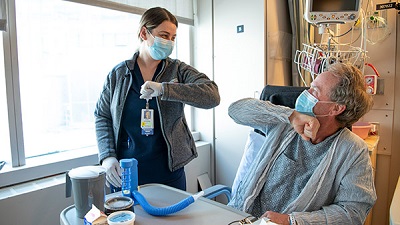Understanding Surgery at Mass General


Data Collection After Surgery
COMPASS is exploring how to automate data collection for mandated surgical patient registries to reduce administrative burden and supply data for quality improvement, research and innovation.
Predicting Surgical Risk Using Artificial Intelligence
COMPASS leverages artificial intelligence to predict and model surgical risk and determine the best interventions, or treatments, for high-risk patients.
Preparing for Recovery After Surgery
Mass General takes a patient-centered, evidence-based approach to surgical care that empowers patients and offers resources for them to use to enhance their recovery after surgery.
COVID-19 and Surgery
COMPASS clinicians have conducted several projects related to understanding the COVID-19 virus and its impact on surgical care and outcomes.
In a reversal of the traditional order of cancer treatment, patients are working hard to build physical fitness and improve nutrition before cancer surgery as part of a new pilot study at the Mass General Cancer Center.
“Instead of rehabilitation, it’s prehabilitation,” says Motaz Qadan, MD, PhD, liver and pancreatic oncologic surgeon, who guides his cancer patients through a fitness and nutrition program for several months before surgery. By measuring their health and disease throughout their treatment, Dr. Qadan and colleagues hope to learn whether patients who improve their fitness and overall health before surgery have better short-term and long-term health afterwards—including how well their cancer is responding to treatment.
View related articles
- Fong Z, Chang D, Lillemoe K, Nipp R, Tanabe K, Qadan M. Contemporary Opportunity for Prehabilitation as Part of an Enhanced Recovery after Surgery Pathway in Colorectal Surgery. Clinics in Colon and Rectal Surgery. 2019 Feb 28. doi: 10.1055/s-0038-1676473
- Sell N, Silver J, Rando S, Draviam A, Santa Mina D, Qadan M. Prehabilitation Telemedicine in Neoadjuvant Surgical Oncology Patients During the Novel COVID-19 Coronavirus Pandemic. Annals of Surgery. 2020 Aug. doi: 10.1097/SLA.0000000000004002
Quality of Life After Surgery
Patient Reported Outcome Measures (PROMs) are a series of scientifically developed questions specific to a disease, condition or surgery. They’re completed by the patient, in their own voice, describing their care experience, symptoms and outcomes. These data are available in the patient's medical record and often used for clinical care during the visit, but also can be used for measuring quality care over time such as well as whether the patient is getting better or worse.
In 2014, Mass General Brigham embraced a plan to design and implement a large-scale PROMs program. Since then, it has built the world's largest PROMs program. Mass General Brigham is striving to make the PROMs program accessible enterprise wide for all health care providers to adopt.
View related publications
- El Moheb M, Herrera-Escobar J, Breen K, Orlas C, Haynes A, Levy-Carrick N, Nehra D, Sanchez S, Salim A, Velmahos G, Kaafarani H. Long-term Outcomes of Psychoactive Drug Use in Trauma Patients: A Multicenter Patient-reported Outcomes Study. Journal of Trauma and Acute Care Surgery. 2021 Feb. doi: 10.1097/TA.0000000000003032
- Melnic C, Paschalidis A, Katakam A, Bedair H, Heng M. Patient-Reported Mental Health Score Influences Physical Function After Primary Total Knee Arthroplasty. The Journal of Arthroplasty. 2020 Oct. 22. doi: 10.1016/j.arth.2020.10.031
- Roth E, Lubitz C, Swan J, James B. Patient-Reported Quality-of-Life Outcome Measures in the Thyroid Cancer Population. Thyroid. 2020 Oct 16. doi: 10.1089/thy.2020.0038
- Sisodia R, Dankers C, Orav J. Factors Associated With Increased Collection of Patient-Reported Outcomes Within a Large Health Care System. JAMA Network Open. 2020 April 14. doi: 10.1001/jamanetworkopen.2020.2764
- Bhashyam A, Ochen Y, van der Vliet Q, Leenen L, Hietbrink F, Houwert R, Dyer G, Heng M. Association of Patient-reported Outcomes With Clinical Outcomes After Distal Humerus Fracture Treatment. Journal of the American Academy of Orthopaedic Surgeons. 2020 Feb. doi: 10.5435/JAAOSGlobal-D-19-00122
Strengthening patient care through measurement & analysis of surgical outcomes and data
The Center for Outcomes and Patient Safety in Surgery (COMPASS) combines clinical collaboration and data to ensure, amongst all surgical and procedural colleagues, the safest, most appropriate and effective and highest quality procedure for every patient, every time.
